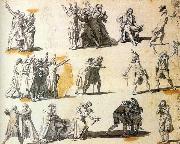|
|
|
|
|
David, Jacques-Louis
|
|
Deputies_swearing_oaths
|
|
|
|
|
|
|
|

|
|
Click to Enlarge
|
| David,_Jacques-Louis
|
Deputies swearing oaths
new21/David, Jacques-Louis-298447.jpg
|
|
|
|
|
|
| 1791 Pen, ink and wash with black chalk, 490 x 600 mm Mus?e National du Ch?teau, Versailles Such an ambitious project as The Oath of the Tennis Court required an enormous amount of preliminary work and David filled two sketchbooks and many individual sheets with details and figure studies. He went to Versailles and drew the empty tennis court, and experimented with the poses of the deputies. As he had not witnessed the oath, he wrote little notes on his sketches to remind himself of how characters should appear, and which small but telling details to include: 'do not forget to show the deputies moved to tears and holding their hands to their eyes', 'remember to show the dust that was raised by the movement of the action' and 'remember the bell' (used not very successfully by Bailly to call the noisy and animated deputies to order). David saw the oath as a modern and greatly expanded version of the Horatii and the deputies became the equivalents of the heroes of antiquity. Author: DAVID, Jacques-Louis Title: Deputies swearing oaths Form: graphics , 1801-1850 , French , study |
|
|
French Neoclassical Painter, 1748-1825
Jacques-Louis David is famous for his huge, dramatic canvasses of Napoleon and other historical figures, including Oath of the Horatii (1784), Death of Marat (1793) and The Sabine Women (1799). Early in his career he was a leader in the neoclassical movement; later his subjects became more modern and political. David was himself active in the French Revolution as a supporter of Robespierre and is sometimes called the chief propagandist for the Revolution; after the Reign of Terror ended he was briefly imprisoned for his actions. When Napoleon took power David became his court painter and created several grand canvasses of the Emperor, including the heroic Napoleon Bonaparte Crossing the Alps (1801) and the enormous Coronation of Napoleon and Josephine (1807). David also painted Napoleon in His Study (1812),
|
|
|
|
|
|
|